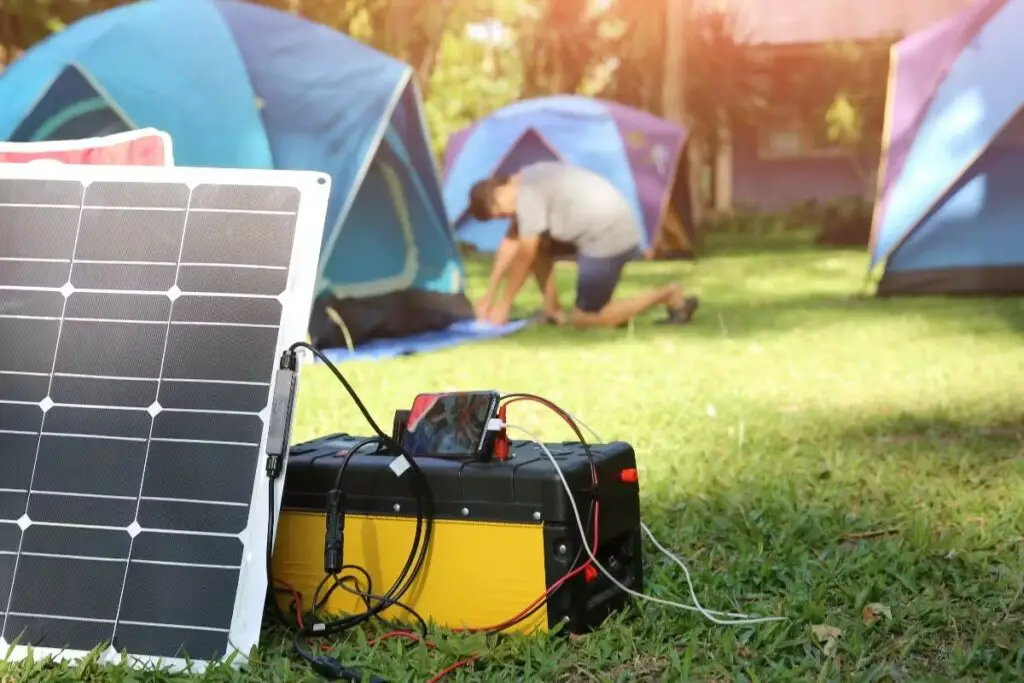Solar generators are a reliable and sustainable power source utilized particularly in remote locations or during power outages.
These units use solar panels to convert sunlight into electricity and this power is stored in batteries for later use.
Unfortunately, there may be times when solar energy cannot fully meet demand – such as during extended cloudy days or high energy consumption.
In these cases, some people may wonder if they can charge their solar generator with a gas generator.
While technically possible, it defeats the purpose of using a renewable energy source and can be environmentally harmful.
Furthermore, it can also be dangerous if not done correctly.
Therefore, exploring alternative backup power options, such as a backup battery or a generator powered by propane or natural gas, is recommended, which are more environmentally friendly and safer to use.
Understanding Solar Generators And Gas Generators
Solar generators are portable power stations that capture and store solar energy in an internal battery, providing electricity for electronic devices, home appliances, or small tools.
Not only these solar generators are eco-friendly and emissions-free, but they are also ideal for outdoor activities, camping trips, and emergency power outages.
Gas generators use fossil fuels such as gasoline, propane, or diesel to generate electricity but offer a reliable, portable, and steady power source.
Solar generators are much more eco-friendly than gas generators due to their hazardous fumes and emissions.
It should be noted that solar generators must be charged through solar panels, not by gas generators.
Charging a solar generator with a gas generator may damage the battery or pose safety hazards.
Thus, it is essential to understand the distinctions between them and use them appropriately.
Pros And Cons Of Charging A Solar Generator With A Gas Generator
Utilizing gas to charge a solar generator provides backup power when no sunlight is available to charge its panels.
This can be especially helpful during extended periods of bad weather or if your solar generator has been heavily used and requires a quick recharge.
However, there are also several disadvantages to charging a solar generator with a gas generator.
They emit harmful fumes and pollutants, making them less eco-friendly options.
Furthermore, gas generators are loud and disruptive, making them unsuitable in quiet settings such as campsites or residential areas.
Gas generators require a constant source of fuel, which can be costly and inconvenient.
Solar generators are typically designed for solar panels and may not be compatible with certain gas generators.
How to Charge A Solar Generator
AC Wall Outlet
An AC wall outlet is convenient and easy to charge a solar generator. It is the most common alternative method and provides a fast recharge.
Car Battery
Charging a solar generator using a car battery is a practical method for outdoor activities where a car is available.
This method uses the car’s 12V DC outlet or jumper cables to charge the solar generator.
Portable Solar Panel
Setting up portable solar panels outdoors is a viable method to charge the solar generator directly.
It is also the most sustainable and eco-friendly approach as it solely depends on renewable solar energy.
Can Gas Generators Charge Solar Batteries?
In off-grid systems, gas generators can charge solar batteries as a backup source when solar panels cannot meet the demand.
This method guarantees a steady power supply even during adverse weather conditions or when the battery has been depleted due to excessive usage.
Gas generators can also serve as backup power in case of equipment failure, bypassing the inverter system and charging directly from the bank of batteries.
However, it is essential to be aware that gas generators emit hazardous fumes and pollutants, making them a less eco-friendly option than solar panels or other renewable energy sources.
Additionally, gas generators require a constant supply of fuel, which can be expensive and inconvenient in the long run.
Therefore, using gas generators appropriately and as a backup option rather than a primary charging source is essential to ensure optimal performance and sustainability.
How Long Does It Take To Charge A Solar Generator To Full Capacity?
Generally, a solar power generator takes less than 48 hours to charge fully, but the charging time can vary depending on several factors.
The size of the solar panels and the amount of sunlight the panels receive both affect the charging speed of solar generators.
Some solar generators, such as MPPT (maximum power point tracking) controllers, have features that speed up the charging process.
Buyers also have the flexibility to place these generators indoors or outdoors, which can also impact the charging time.
Overall, solar generators offer a convenient and eco-friendly way to generate electricity, making them an attractive option for those looking for off-grid power solutions.
What Is The Typical Length Of Time A Solar Generator Can Hold A Charge?
When a solar generator’s battery is fully charged, it can generally hold the charge for up to a year before recharging.
However, the duration for which the generator holds a charge can vary depending on the specific model and its battery capacity.
The battery’s cycle life is also a crucial factor that affects the duration for which a solar generator can hold a charge.
Solar generators offer a sustainable and reliable source of electricity, making them an ideal solution for emergencies or outdoor activities.








